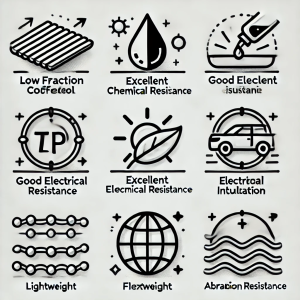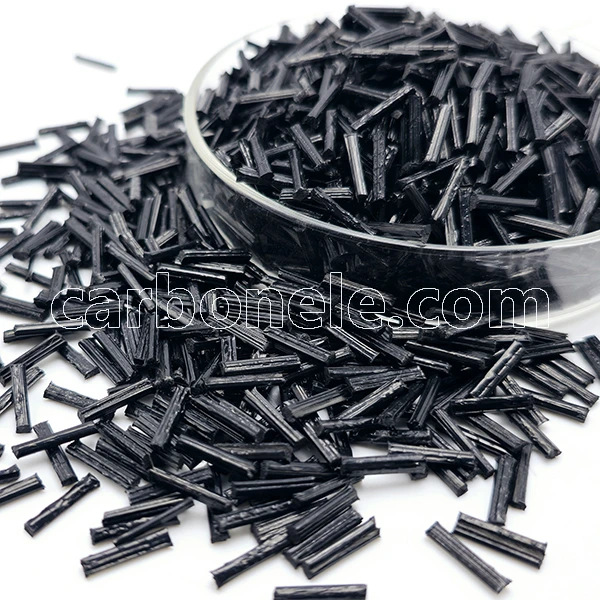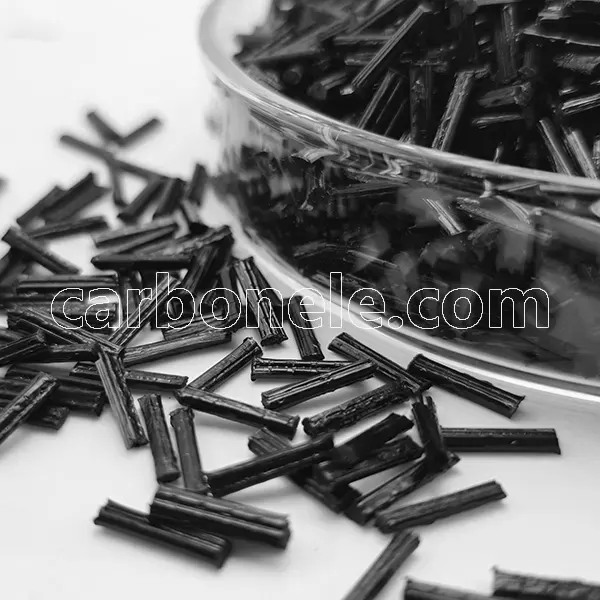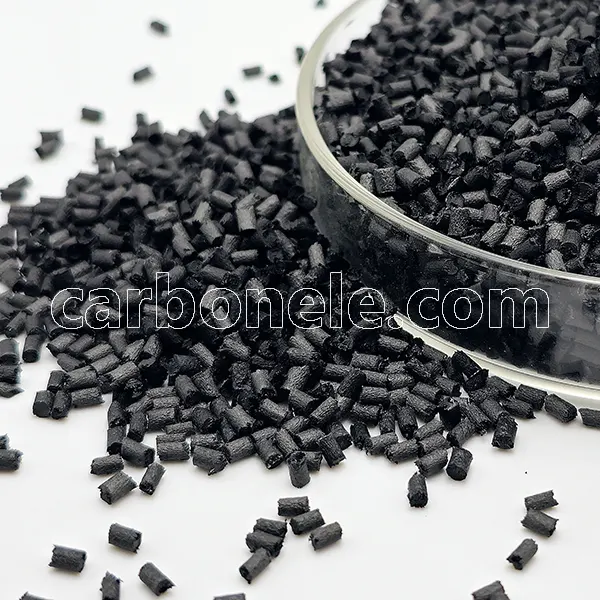Differents between TPU and TPU-CF (Thermoplastic Polyurethane – Carbon Fiber Reinforced Plastic)
1. High-Temperature Resistance:
TPU: The Heat Deflection Temperature (HDT) of TPU is typically around 80°C to 100°C.
TPU-CF: The heat resistance of TPU CF is significantly improved due to the addition of carbon fibers, increasing the HDT to around 150°C to 170°C, which is a considerable improvement over unreinforced TPU. TPU-CF can also withstand temperatures up to 200°C for short periods without losing its mechanical properties.
Application: TPU is generally used in moderate temperature environments, while TPU CF is suitable for applications involving higher temperatures, such as automotive and industrial components.
2. Mechanical Properties:
TPU: The tensile strength of TPU is typically around 40-60 MPa. It offers moderate rigidity and flexibility but lacks the extreme strength required for high-stress applications.
TPU-CF: TPU-CF has significantly enhanced mechanical properties due to the carbon fiber reinforcement. The tensile strength increases to around 100-150 MPa, and its bending strength is typically in the range of 150-250 MPa. The tensile modulus (rigidity) is also much higher at 150-250 MPa compared to TPU‘s lower modulus.
Impact Resistance: TPU CF offers higher impact resistance (5-10 KJ/m²) compared to regular TPU (typically around 3-5 KJ/m²).
Application: TPU is commonly used in flexible, low-load applications like seals, gaskets, and footwear, while TPU CF is ideal for structural components, automotive parts, and aerospace applications where higher strength and rigidity are required.
3. Chemical Resistance:
TPU: TPU has good resistance to oils, greases, and some chemicals but may degrade when exposed to strong acids or bases.
TPU-CF: TPU CF exhibits enhanced chemical resistance, especially at higher temperatures, due to the carbon fiber reinforcement. It can withstand exposure to a wider range of chemicals such as organic solvents, oils, and industrial fluids.
Application: TPU is used in consumer goods, medical devices, and coatings, whereas TPU CF is better suited for harsh industrial environments, including chemical and fuel systems.
4. Friction and Wear Properties:
TPU: TPU has a friction coefficient typically between 0.3 to 0.5 and offers moderate resistance to wear and tear.
TPU-CF: TPU CF has a lower friction coefficient of 0.2 to 0.3, making it more suitable for high-wear conditions. The carbon fiber reinforcement also significantly reduces the wear rate, making TPU CF ideal for high-load applications such as automotive drivetrains and bearings.
Application: TPU is used in softer applications like seals and protective coatings, while TPU CF is used in high-stress mechanical components like gears, bearings, and automotive parts.
5. Dimensional Stability:
TPU: TPU has a relatively high coefficient of thermal expansion (CTE) in the range of 80-150 µm/m·K, which can lead to dimensional instability under fluctuating temperatures.
TPU-CF: The addition of carbon fibers reduces the CTE of TPU-CF to around 50-80 µm/m·K, enhancing its dimensional stability. This makes TPU CF ideal for precision components that need to maintain their shape despite temperature changes.
Water Absorption: TPU absorbs water at a rate of 0.5-1%, while TPU CF retains a much lower water absorption rate, typically around 0.3%.
Application: TPU is used in flexible applications that are less sensitive to dimensional stability, while TPU CF is suitable for components exposed to high-temperature environments with temperature fluctuations, like aerospace and automotive parts.
6. Electrical Insulation Properties:
TPU: TPU has a volume resistivity of about 10^12 Ω·cm, which gives it good electrical insulation properties, making it suitable for electrical cables and connectors.
TPU-CF: TPU CF retains excellent electrical insulation properties despite the addition of carbon fiber, maintaining a volume resistivity of about 10^13 to 10^14 Ω·cm. The dielectric constant of TPU CF is around 3.0, making it suitable for high-frequency applications.
Application: TPU is often used in electrical cables, medical devices, and insulation coatings, while TPU CF is used for high-performance electrical components, such as circuit boards, connectors, and components for electrical systems in automotive or aerospace industries.
7. Lightweight Characteristics:
TPU: TPU has a density of around 1.2 g/cm³, which is relatively light compared to metals.
TPU-CF: TPU CF has a density of about 1.4 g/cm³, which is slightly higher due to the carbon fiber, but still lighter than metals such as aluminum (2.7 g/cm³) and steel (7.8 g/cm³). This lightweight nature is a significant advantage in applications where weight reduction is crucial.
Application: TPU is ideal for flexible, lightweight applications in consumer goods and soft materials, while TPU CF is used in applications where both strength and lightness are required, such as in the automotive and aerospace industries.
Summary Table:
| Performance Feature | TPU | TPU-CF (Carbon Fiber Reinforced) | Application Areas |
|---|---|---|---|
| High-Temperature Resistance | Heat Deflection Temperature: ~100°C | Heat Deflection Temperature: ~150°C-170°C | Automotive, Aerospace, Industrial Applications |
| Operating Temp: -40°C to 90°C | Operating Temp: up to 200°C (short periods) | ||
| Mechanical Properties | Tensile Strength: 40-60 MPa | Tensile Strength: 100-150 MPa | Structural parts, Automotive, Mechanical Parts |
| Bending Strength: ~40-80 MPa | Bending Strength: 150-250 MPa | ||
| Tensile Modulus: 30-80 MPa | Tensile Modulus: 150-250 MPa | ||
| Chemical Resistance | Moderate chemical resistance | Enhanced chemical resistance at high temps | Chemical Industry, Pumps, Valves, Pipes |
| Friction and Wear Properties | Friction Coefficient: 0.3-0.5 | Friction Coefficient: 0.2-0.3 | Automotive drivetrains, Bearings, Mechanical parts |
| Moderate wear resistance | Low wear rate | ||
| Dimensional Stability | Coefficient of Thermal Expansion: ~80-150 µm/m·K | Coefficient of Thermal Expansion: ~50-80 µm/m·K | Precision Mechanical Parts, Aerospace |
| Water Absorption: ~0.5-1% | Water Absorption: ~0.3% | ||
| Electrical Insulation | Volume Resistivity: ~10^12 Ω·cm | Volume Resistivity: ~10^13-10^14 Ω·cm | Electronics, Electrical Applications |
| Dielectric Constant: ~3.5 | Dielectric Constant: ~3.0 | ||
| Lightweight Characteristics | Density: ~1.2 g/cm³ | Density: ~1.4 g/cm³ | Aerospace, Automotive, Lightweight Applications |
| Application Area | Examples of Use |
|---|---|
| Automotive Industry | Engine components, fuel systems, bearings, gears, etc. |
| Aerospace | Structural components, engine parts, wing structures, etc. |
| Chemical Industry | Pumps, valves, pipe liners, etc. |
| Electronics and Electrical | High-frequency circuit boards, connectors, electrical insulation |
If you want to get more information about TPU-CF, you can vist our Youtube.

Feature Product
-
PA12 LCF30 for Drone Fuselages & Wings
What do you know about PA12 LCF30? PA12 ...
-
Competitive Price PA6 LCF30 Composites
What’s it? PA6 LCF30, which stands...
-
ABS CF10 Compound ABS 10%CF Thermoplastic Compo...
What’s ABS CF10? ABS CF10 refers t...









